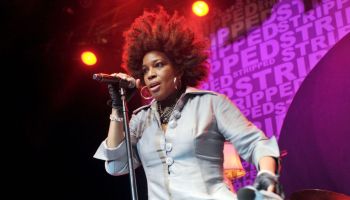You’ve seen the fabulous Pam Grier in many movies where she plays the independent woman with a cause who handles her business, gets the bad guys and then walks off into the sunset by herself. From 1974’s “Foxy Brown” to 1997’s “Jackie Brown,” that’s been the iconic actress’ M.O.
Well, Grier is much like that in real life. One of the only African-American sex symbols in cinema history, she ruled the 70’s in classic blaxsploitation films like the aforementioned “Foxy Brown,” 1975’s “Sheba Baby” and “Friday Foster” and more. After a career decline during the ebb of the that era, Grier began to carve out a new niche for herself, a return made complete by fan Quentin Tarantino, who wrote “Jackie Brown” with her in mind.
After a five-year stint on the controversial Showtime series “The L Word,” Grier appears in the Common/Queen Latifah movie, “Just Wright,” opening May 14, and has also just been cast in an upcoming film with Juila Roberts and Tom Hanks.
Grier’s new book, “Foxy,” details her personal life as an actress involved with some of the most famous men of the era, but doesn’t say much about her sexy image or her celebrity. She lives in a modest home on a ranch in Colorado and would rather ride horses, make movies and enjoy life than rest on her laurels. We talked to her recently about her life and career.
BlackAmericaWeb.com: I have to confess I’ve been representing you for years, and the best compliment I’ve ever gotten is that I have an aura similar to yours. I can’t take credit for any resemblance to you, but maybe we favor in height, stature and complexion. (Note to readers: This is not MY vanity, it’s what has been said to me several times over the years. Just wanted to make that clear.)
PAM GRIER: I think we resemble and favor each other because I get my womanhood and my femininity and my spark from other women. I think our beauty comes from our confidence – Our confidence in our beauty and what we wear and what we drink and how we want to self-improve. I think that’s how we resemble. (Thanks, Pam.)
The book could have been twice as long – there were so many more questions it left unanswered! But one of them is that, despite your status as a sex symbol, it doesn’t seem like you really cared much about that aspect of your life.
I believe that your sexuality is not who you are. I don’t define myself by my age or by my sexuality. I define myself by my energy. I think there’s so much to life, we don’t have time to say, ‘Okay, I’m going here; should I look sexy?’ Your sexuality, your sexiness is not a lifestyle. It’s not a thought process for me. You become a beacon of sexuality because of who you are. And again, I reiterate, confidence. So as far as putting [sexuality] forth, that’s not who I am.
So as far as your career and how people perceived you, what kind of impact did that have on you? In the book, it really seems as though you weren’t thinking about that at all.
You’re absolutely right. I was not. (Laughs.) I let everyone else think about it. Let everyone else sweat. (Laughs.) That’s not what I think about. I think about reading books and social issues and our country and I think about many, many other things.
















